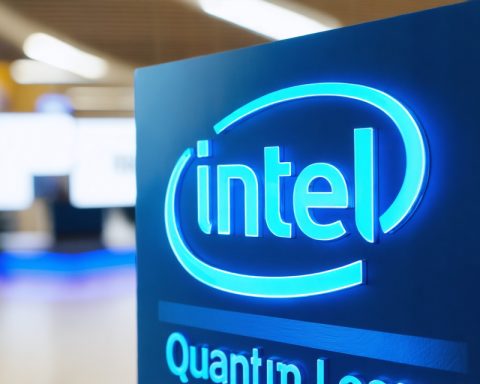- Alibaba is investing over $52 billion in artificial general intelligence (AGI) over the next three years.
- The initiative aims to revolutionize markets, supply chains, and customer interactions by developing advanced AI systems.
- Alibaba joins global tech giants like OpenAI, Google, and Meta in pursuing AI with capabilities akin to human reasoning.
- This bold move has significant business implications and has already boosted Alibaba’s stock by 68% this year.
- Collaborations, such as with Apple on AI-powered iPhones, highlight Alibaba’s leadership in the AI landscape.
- Alibaba’s investment signals a future where AI moves from functional to transformative, shaping the technology frontiers.
The hum of innovation fills the atmosphere as Alibaba, the Chinese tech titan, sets its sights on a bold frontier—artificial general intelligence (AGI). Across the bustling landscape of tech giants racing to capture the AI crown, Alibaba has announced a staggering investment: over $52 billion dedicated to AI over the next three years. This monumental leap promises to reshape the digital domain and beyond.
Picture this: smart systems that not only anticipate market trends but also revamp supply chains seamlessly. Imagine a single AI capable of resolving customer queries while stealthily informing the next generation of products. This is the vision Alibaba’s leadership has in mind as they embark on their technological odyssey.
With a commitment to expanding the very boundaries of intelligence, Alibaba’s strategy echoes a global chorus. Giants like OpenAI, Google, and Meta chase similar ambitions, each vying for a foothold in crafting AI with reasoning capabilities akin to human intellect. The implications for business and daily life are vast. Within this brave new world, AI doesn’t just respond—it anticipates, adapts, and crafts solutions from the interwoven strands of data.
Already, Alibaba’s foresight has stirred excitement among investors, propelling its stock upward by 68% this year. In the grand tapestry of innovation, Alibaba stands poised not merely as a participant in China’s AI race but as a leader, spotlighting collaborations such as its influential partnership with Apple to forge AI-powered iPhones for the Chinese market.
The takeaway? Alibaba’s investment is not just a financial wager; it is a declaration. A future where AI extends beyond mere functionality to transformative intelligence is swiftly on the horizon. As the boundaries of technology expand, the horizon seems ever closer, infused with the promise of what’s next.
How Alibaba’s $52 Billion AI Venture Could Change the World
How-To Steps & Life Hacks
For businesses looking to emulate Alibaba’s AI strategy, consider the following:
1. Invest Heavily in Research and Development: Alibaba’s $52 billion investment is a testament to the importance of R&D in AI. Allocate a significant portion of your resources to developing and experimenting with AI technologies.
2. Cultivate Strategic Partnerships: Just as Alibaba has partnered with tech leaders like Apple, seek collaborations that can bolster innovation and implement AI solutions at scale.
3. Focus on AI that Anticipates: Develop systems that don’t just react to data but predict future trends. This strategy can revolutionize supply chain logistics, customer service, and product development.
Real-World Use Cases
Multiple industries could benefit from Alibaba’s aggressive push into AI:
– Retail: Personalized shopping experiences powered by AI can lead to increased customer satisfaction and loyalty.
– Healthcare: AI can assist in predictive diagnostics and personalized medicine, improving patient outcomes.
– Finance: Risk assessment and fraud detection can be enhanced through sophisticated AI analysis.
Market Forecasts & Industry Trends
The AI market is expected to reach $126 billion by 2025, with a CAGR of 37.3% from 2021 to 2025. As a leader, Alibaba’s advancements in AGI could capture a significant share, shifting market dynamics in favor of those who successfully integrate AI technologies into their core processes.
Reviews & Comparisons
Alibaba’s AI pursuit is often compared to similar initiatives by OpenAI, Google, and Meta:
– OpenAI focuses on developing general AI technologies that are safe and beneficial.
– Google leverages its vast data ecosystem to enhance its search, advertising, and autonomous systems.
– Meta invests in AI to promote immersive experiences in platforms like the metaverse.
Controversies & Limitations
While AI promises significant benefits, concerns about data privacy, security, and the ethical implications of AGI persist. Regulatory bodies worldwide are scrambling to keep pace with rapid advancements, raising questions about oversight and control.
Features, Specs & Pricing
Details on features and specifications specific to Alibaba’s AGI projects are scarce; however, the likely areas of innovation include cloud-based AI frameworks, machine learning algorithms, and real-time data processing capabilities.
Security & Sustainability
Alibaba places emphasis on secure AI systems that are sustainable. This involves using energy-efficient data centers and implementing robust cybersecurity measures to protect data integrity.
Insights & Predictions
Alibaba’s investment could establish it as a world leader in AI, influencing industries worldwide. AI will likely become increasingly embedded in everyday products, from smart homes to automated workplaces.
Tutorials & Compatibility
Alibaba Cloud offers a suite of tools and APIs that developers can utilize to integrate AI functionalities into their applications, ensuring compatibility across diverse platforms.
Pros & Cons Overview
Pros:
– Enhanced capabilities in data processing and predictive modeling.
– Strategic collaborations that promote rapid technological deployments.
– Potential to capture significant market share in AI sectors.
Cons:
– Immense financial risk if AI projects don’t deliver expected returns.
– Heightened regulatory scrutiny and potential ethical dilemmas.
Actionable Recommendations
– Start Small: Test AI implementations in one aspect of your business to gauge effectiveness and ROI.
– Stay Informed: Regularly update strategies according to the latest AI trends and market developments.
– Focus on Ethics: Ensure responsible AI development by prioritizing transparency and fairness in data handling.
For more information on Alibaba’s technological ventures, visit Alibaba.











